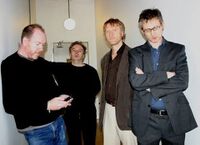The High Llamas: Difference between revisions
No edit summary |
|||
| Line 1: | Line 1: | ||
[[Category:Influenced by Morrissey / The Smiths]] | [[Category:Influenced by Morrissey / The Smiths]] | ||
[[Category:Covered Morrissey / The Smiths]] | [[Category:Covered Morrissey / The Smiths]] | ||
[[File:The-high-llamas-deaf-institute-manchester.jpg | 200px | right | thumb |The High Llamas]] | |||
==Relevance== | ==Relevance== | ||
Covered [[Covered Song::Frankly, Mr. Shankly]] on the tribute compilation [[The Smiths Is Dead]] (1996). | Covered [[Covered Song::Frankly, Mr. Shankly]] on the tribute compilation [[The Smiths Is Dead]] (1996). | ||
Latest revision as of 11:10, 2 February 2024
Relevance
Covered Frankly, Mr. Shankly on the tribute compilation The Smiths Is Dead (1996).
Discogs Information
Profile
London-based group formed in 1992. Much of the story of the High Llamas is the story of Sean O'Hagan. Upon leaving Microdisney in 1988. O'Hagan then released a solo effort titled High Llamas, the title and album cover of which came from a magazine picture of a Victorian hot-air balloon. In 1992, O'Hagan formed the High Llamas and recorded the Apricots mini-LP, of which the JBM label took 5 of the 6 tracks, added 4 more and released it as the debut full-length Santa Barbara. Their next album Gideon Gaye met with high praise from critics upon its release in 1994. Since that time, the Llamas have been putting out "avant pop" records on a fairly consistent basis.
External Links
- https://www.discogs.com/artist/2815-The-High-Llamas
- https://highllamas.com/
- https://thehighllamas.bandcamp.com/
- https://www.dragcity.com/artists/the-high-llamas
- https://www.eatyourownears.com/events/high-llamas/
- https://www.facebook.com/highllamas/
- https://en.wikipedia.org/wiki/The_High_Llamas
Wikipedia Information
 |
The High Llamas are an Anglo-Irish avant-pop band formed in London circa 1991. They were founded by singer-songwriter Sean O'Hagan, formerly of Microdisney, with drummer Rob Allum and ex-Microdisney bassist Jon Fell. O'Hagan has led the group since its formation. Their music is often compared to the Beach Boys, a band he acknowledges as an influence, although more prominent influences were drawn from bossa nova and European film soundtracks. O'Hagan formed the High Llamas after the breakup of his group Microdisney. The band initially played in a more conventional acoustic pop style, but after he joined Stereolab as a keyboardist, he was inspired to revamp the group's music closer to the electronic and orchestral sound he preferred. Their second album, Gideon Gaye (1994), anticipated the mid 1990s easy-listening revivalist movement, and its follow-up Hawaii (1996) nearly led to a collaboration with the Beach Boys.
